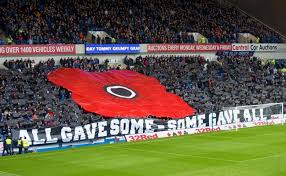November 2 – In what will be construed in some quarters as a move totally lacking in compassion, FIFA has rejected a request from England and Scotland for their players to wear Armistice Day armbands featuring poppy symbols during next week’s World Cup qualifier at Wembley.
November 11 is the day when the United Kingdom traditionally remembers its war dead but Scottish FA chief Stewart Regan says FIFA, which bans political, religious or commercial messages on shirts, is “sticking to the letter of the law”.
Damian Collins, chair of Britain’s the Commons’ Culture, Media and Sport select committee has written to FIFA president Gianni Infantino asking for the decision to be reversed.
FIFA’s stance regarding the poppies drew fierce criticism and went all the way to top of government where British Prime Minister Theresa May described the ruling as “outrageous”.
“Before they start telling us what to do, they jolly well ought to sort their own house out,” said Mrs May. “Our football players want to recognise and respect those who have given their lives for our safety and security – I think it is absolutely right they should be able to do so.”
Separately, the Welsh FA says it, too, is seeking approval for its players to wear the poppy symbol on shirts for the game against Serbia on November 12.
In 2011, FIFA eventually backed down after threatening to ban the England team from wearing poppies in a friendly against Spain, allowing them to display the symbol on black armbands. An FA statement read: “In recent weeks, the FA has led remembrance discussions with FIFA to allow the England team to show its support for the poppy appeal during the World Cup qualifier with Scotland.”
Regan said he and English FA chief executive Martin Glenn would be meeting FIFA officials on Thursday to discuss the poppy issue. “We will be asking for their support to try to give the people of England and Scotland what they want,” Regan told the BBC. “That is to use this match of a way of remembering people who lost their lives in the war.
“I can understand why they are doing this, but it is nothing more than a mark of respect. It is a personal choice. This is not about making some political point.”
Over the remembrance weekend youth and adult teams on pitches across the UK traditionally hold a minute’s silence to remember those who have fallen in military conflict, few families in Britain have not experienced war death in their not too distant past.
In Britain football is considered a predominantly working class sport. Most of the casualties in the first and second world wars in particular were working class people, very many of them footballers of some sort, including players from the professional ranks who gave up their careers and often their lives. Poppies are a symbol of the respect, thanks and remembrance of those that gave their lives, in football terms, before the final whistle should have been blown.
Contact the writer of this story at moc.l1745178283labto1745178283ofdlr1745178283owedi1745178283sni@w1745178283ahsra1745178283w.wer1745178283dna1745178283

